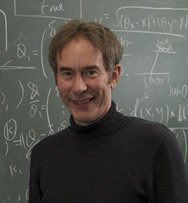SU Humanities Center, physics department team up for Wali Lecture October 6
Purdue physicist Ian Shipsey discusses "bionic hearing"

Renowned particle physicist Ian Shipsey will deliver the Kameshwar C. Wali Lecture in the Sciences and Humanities at Syracuse University. The lecture, “Bionic Hearing: The Science and the Experience,” is on Thursday, Oct. 6, at 4 p.m. in Maxwell Auditorium. It is free and open to the public. The event is co-sponsored by the Department of Physics and The SU Humanities Center, both units of The College of Arts and Sciences. For more information, contact The SU Humanities Center at 315-443-7192 or visit http://syracusehumanities.org.
“We are thrilled to present Ian Shipsey, whose groundbreaking work in physics and bionics redefines the possibilities of individual and social identity,” says Gregg Lambert, Dean’s Professor of the Humanities and director of both The SU Humanities Center and Central New York Humanities Corridor. “He is a ‘pioneer’ in every sense of the word—one whose scholarship cuts across science, technology, engineering and the humanities.”
Shipsey, the Julian Schwinger Distinguished Professor of Physics at Purdue University, became profoundly deaf at age 30. Twelve years later, he received a cochlear implant that not only gave him bionic hearing, but also allowed him to make out his daughter’s voice for the first time. Since then, Shipsey has spoken extensively about his experiences, about the technology of auditory prostheses and about the broader implications of bionic technologies and disability.
“Ian Shipsey is truly inspirational,” says Eric Schiff, professor of physics and chair of the Wali Lecture Committee. “Not only does his work embody the creative spirit of Kameshwar C. Wali, one of our most distinguished professors, but also his newfound hearing is an extension of his physics research. He epitomizes the liberal arts academic.”
A leading particle physicists, Shipley frequently performs experiments at the Fermilab collider in Illinois and at CERN in Switzerland, site of the most powerful atom smasher in the world. He has had many distinctions in physics throughout his career, including election to fellowship in the American Physical Society. In 2005, Shipsey shared in the Particle Physics Prize of the European Physical Society—awarded to the team that discovered direct CP violation, revealing new differences in the behaviors of matter and anti-matter. Shipsey has also been inducted into “The Book of Great Teachers,” a permanent wall display at Purdue University, celebrating excellence in teaching and scholarship.
Wali is SU’s Steele Professor of Physics Emeritus. He is internationally recognized both as a theorist—for his research on the symmetry properties of fundamental particles and their interactions—and as an author of “Cremona Violins: A Physicist’s Quest for the Secrets of Stradivari” (World Scientific, 2010) and “Chandra: A Biography of S. Chandrasekhar” (University of Chicago Press, 1991). An SU faculty member since 1969, Wali has held additional positions at Harvard University, the University of Chicago, Northwestern University, Ben-Gurion University of the Negev (Israel), Institutes des Hautes Etudes Scientifiques (France) and the International Center for Theoretical Physics (Italy). He is a fellow of the American Physical Society, the recipient of the society’s India Chapter “Scientist of the Year” award, and the recipient of the SU Chancellor’s Citation for exceptional academic achievement.
The SU Humanities Center, founded in 2008, fosters public engagement in the humanities, and is home to the Syracuse Symposium, the Central New York Humanities Corridor, the Jeanette K. Watson Distinguished Visiting Professorship and Visiting Collaborator programs, the HC Mini-Seminar and Symposium Seminar series, the Perpetual Peace Project, and other annual research initiatives, annual fellowships, and public programming.
Media Contact
Rob Enslin
